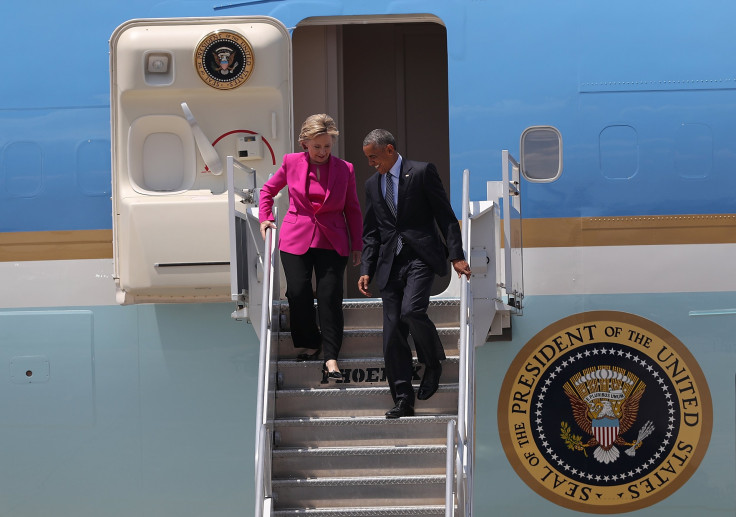What Really Happened With Hillary Clinton's Emails? FBI Finds 110 Messages With Classified Information, Won't Bring Charges

The FBI recommended on Tuesday that no criminal charges be filed over Hillary Clinton's use of private email servers while she was secretary of state, but sharply rebuked the Democratic U.S. presidential candidate for "extremely careless" handling of classified information.
While FBI Director James Comey's announcement lifted a cloud of uncertainty for Clinton's White House campaign, his strong criticism of her judgment is likely to fuel a continued onslaught on the email issue by her Republican presidential rival, Donald Trump.
In a lengthy statement on the Federal Bureau of Investigation's conclusions from its year-long investigation, Comey directly contradicted statements Clinton has made while defending her use of the private email set-up.
He said, for example, that the FBI found at least 110 emails that contained classified information when they were sent, although she has repeatedly said she never sent or received classified information on her private servers.
"Although we did not find clear evidence that Secretary Clinton or her colleagues intended to violate laws governing the handling of the classified information, there is evidence that they were extremely careless in their handling of very sensitive, highly classified information," Comey said.
But he said the FBI concluded "no reasonable prosecutor" would bring charges. "Although the Department of Justice makes final decisions on matters like this, we are expressing to Justice our view that no charges are appropriate in this case," Comey told reporters in Washington.
His recommendation will likely stand. The country's top prosecutor, U.S. Attorney General Loretta Lynch, said on Friday that she would accept the recommendations of career prosecutors and the FBI director on whether to charge Clinton for mishandling emails.
The FBI probe has dogged Clinton for the past year, contributing to her low poll ratings on honesty and trustworthiness. Republicans have pointed to the controversy as evidence that she considered herself above the law.
Clinton's campaign was anxious to move on after Comey's announcement, saying in a statement it was "pleased" with the FBI decision.
"As the secretary has long said, it was a mistake to use her personal email and she would not do it again. We are glad that this matter is now resolved," spokesman Brian Fallon said.
He did not respond to questions about Comey's rebuttal of the main arguments Clinton has offered in defense of her email.
Trump has hammered Clinton on the issue, saying the investigation should disqualify her from being president, and he is unlikely to let up.
On Tuesday, he said the FBI decision was unfair. "The system is rigged," he said on Twitter. "As usual, bad judgment."
Comey's announcement came hours before Clinton's first campaign appearance with President Barack Obama, in North Carolina. It also came less than three weeks before the Democratic National Convention at which Clinton is to be nominated as the party's candidate for the Nov. 8 election.
The FBI has been investigating whether Clinton broke the law as result of personal email servers kept in her Chappaqua, New York, home while she was secretary of state from 2009 to 2013. One of the questions is whether she mishandled classified information on the servers.
As the investigation wound up, Clinton underwent a voluntary 3-1/2-hour interview with the FBI on Saturday in Washington.
Comey said the FBI did not find that Clinton or her colleagues intended to violate the law, and that there was no "intentional misconduct" by her lawyers who sorted her emails.
He said her staff should have known Clinton's private email was an improper place for classified information, but there was no evidence that anyone had hacked Clinton's communications.
The FBI found 110 emails in 52 email chains that contained information that was classified at the time the messages were sent, Comey said. Eight of those chains contained "top secret" information, the highest level of government classification for material that could harm national security.
Another 36 email chains contained "secret" information, and eight "confidential" information, he said. Agents also found three classified emails among the thousands Clinton never returned to the State Department.
Comey said there were no previous cases that supported filing criminal charges against Clinton. Other cases had involved intentional mishandling of information, he said, and there was no evidence Clinton knew she was violating the law.
Last year, the FBI recommended that former CIA director David Petraeus be charged with a felony for his mishandling of classified information with his biographer, with whom he was having an affair.
In that case, however, the FBI had evidence that Petraeus knew the information was highly classified. Petraeus eventually pleaded guilty to a misdemeanor charge of mishandling classified information.
Republican lawmakers have called for an independent investigation of Clinton, saying they do not trust the Justice Department to handle the inquiry with impartiality.
Republican criticism of the process heated up after Clinton's husband, former President Bill Clinton, met privately with Attorney General Lynch in Phoenix last week. Lynch, who was appointed by Obama, later said she regretted the meeting and said she and Bill Clinton did not discuss the investigation.
After Comey's statement, Clinton quickly became one of the top trending topics on Twitter, with about 515,000 tweets posted by early afternoon. The overall sentiment was more negative than positive, with about 3.5 negative tweets for every positive tweet, according to social media analytics firm Zoomph.
House of Representatives Speaker Paul Ryan, the highest ranking elected Republican, said Comey's announcement "defies explanation."
"Declining to prosecute Secretary Clinton for recklessly mishandling and transmitting national security information will set a terrible precedent," Ryan said. "The American people will reject this troubling pattern of dishonesty and poor judgment," he said.
© Copyright IBTimes 2024. All rights reserved.





















